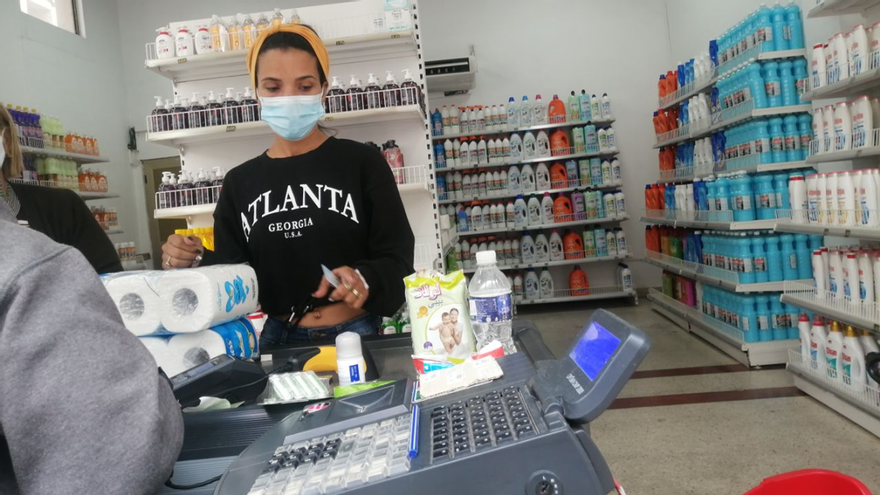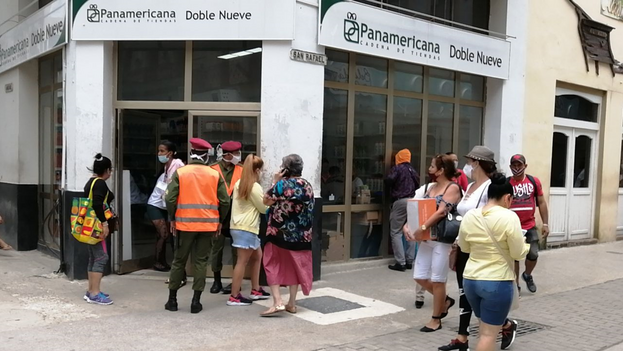
![]() 14ymedio, Havana, 20 December 2020 — As he leaves the store, he passes the magnetic card to his sister who is still waiting in line. Not only do they share the form of payment in La Arcada, a foreign exchange business on Havana Boulevard, but they also share the profits from the informal resale of deodorant, detergent and shampoo, the products that are scarce in the network of stores that take national currency.
14ymedio, Havana, 20 December 2020 — As he leaves the store, he passes the magnetic card to his sister who is still waiting in line. Not only do they share the form of payment in La Arcada, a foreign exchange business on Havana Boulevard, but they also share the profits from the informal resale of deodorant, detergent and shampoo, the products that are scarce in the network of stores that take national currency.
Until a year ago, Natacha and Nadia — whose names have been changed for this story — were prosperous mules who made the trip between Havana and Panama City several times a month. “But the pandemic arrived, commercial flights were canceled and we had to reinvent ourselves,” Natacha explains to 14ymedio.
At first, when the closure of the airports seemed likely to be a short term thing, they continued to sell the merchandise that they had accumulated from their last trips. Then they began to stand in long lines to buy chicken and other foods that they offered at a higher price to “several willing customers who would to pay anything so as not to spend five hours” in line outside a store, details Nadia.
But “salvation came in July,” explains this 38-year-old woman from Havana with two young children. “When I was traveling to Panama, I had the good idea of creating a bank account there and I have a Visa debit card that I can use to buy in the foreign currency stores where they sell food and hygiene products.”
The sisters began to prepare for their new business since, through independent media, they learned that the offerings in freely convertible currency (MLC) were going to also extend to food and merchandise in short supply such as soap, laundry detergent and sanitary pads for women.
However, it was Cuban president Miguel Díaz-Canel’s speech confirming the opening of these foreign exchange businesses that served as the starting shot. “As soon as he finished speaking, I turned off the television and began calling my contacts to tell them that they could give me orders, that I had a dollar card to buy in those places,” Natacha explains.
Since then, their client network has grown and both sisters have developed a method of not exposing themselves too much. “We go to two different stores every week and so we rotate so that we don’t just go to one, lest an employee denounce us and accuse us of being resellers or hoarders,” says Nadia. “We are earning more than when we traveled to Panama.”
The hard currency stores have generated deep unrest among broad sectors. Faced with the avalanche of popular complaints about the social differences that these markets exacerbate, the Minister of Economy, Alejandro Gil, tried to calm the spirits and insisted that the opening of stores in foreign currency for the sale of food and cleaning products was “a decision of social justice and socialism.”

“An undersupplied market does not attract foreign currency,” the minister explained then, referring to what many Cubans have classified as the “monetary apartheid” that divides society between those who have dollars to buy products in these shops and those who must make do with the network of stores that take payment in national currency.
But to the same extent that a large part of Cuban society criticizes the opening of these stores in MLC, others have seen their resources grow, serving as a bridge between the merchandise in dollars and the anxious customers who can not find these products in the stores in Cuban or convertible pesos.
“I started out buying only shampoo, but now they tell me right away that they need toilet paper, hair softener, coffee or beer,” explains Humberto, a merchant with a small stall on Galiano street where, according to his license, only can only sell objects linked to Afro-Cuban religions. But a few yards from the table with necklaces and bracelets on display at the door of his house, he has “everything,” he boasts.
Stacked under a ladder Humberto shows customers disposable razors, hair dyes, packages of various brands of coffee, oil, imported tomato sauce, dish soap and large quantities of products for cleaning the home, kitchen and the bathrooms. “Don’t stand in line, I’ll do it for you and if you don’t have a dollar card, I also have that for you,” he says.
Humberto’s magnetic card was sent to him by a brother who lives in Spain. “From his own bank account he took out a debit card that he sent me and the original idea is that he would load onto it the remittance that my mother sends every month and I would take it out at the ATM, but I never imagined that this plastic was going to be the way I was going to earn a living.”
One of the great advantages, according to the informal merchant, is that “in stores they don’t care if your identity card says one name and the card another, so in addition to selling these products I rent the card to trusted people,” he explains. “For every dollar they spend they have to pay me 1.25 CUC and there are days when this card is used up to ten times at the same store.”
Humberto believes that, despite all the controls that govern the operations of the stores that sell in pesos, in the stores in foreign currency everything is “more relaxed.” The reason for a certain laxity is, in his opinion, very evident: “They want dollars and they want them at full speed, so they don’t start looking at where they come from or who has them. The route of those with MLC seems like a road without obstacles.
____________
COLLABORATE WITH OUR WORK: The 14ymedio team is committed to practicing serious journalism that reflects Cuba’s reality in all its depth. Thank you for joining us on this long journey. We invite you to continue supporting us by becoming a member of 14ymedio now. Together we can continue transforming journalism in Cuba.
